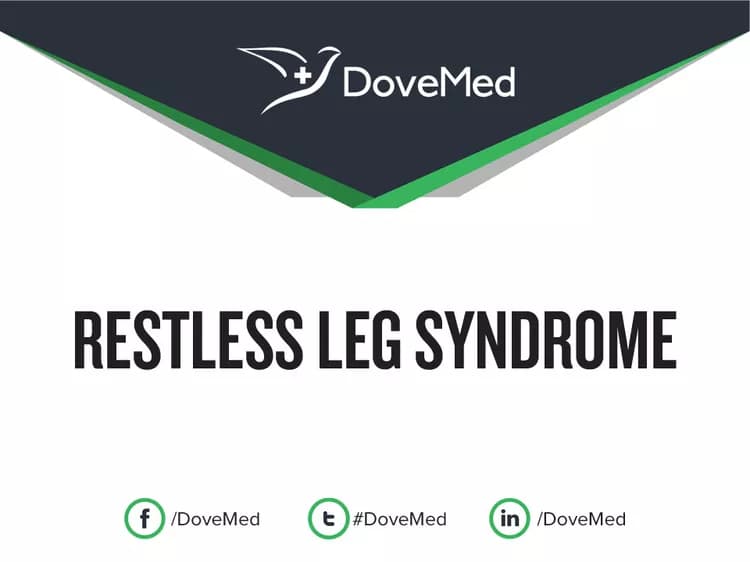What are the other Names for this Condition? (Also known as/Synonyms)
- RLS (Restless Leg Syndrome)
- Willis-Ekbom Disease (WED)
- Wittmaack-Ekbom Syndrome
What is Restless Leg Syndrome? (Definition/Background Information)
- Restless Leg Syndrome (RLS) is a neurological condition in which there is a constant urge to move one’s legs to prevent an unpleasant sensation. The symptoms usually occur while the individual is trying to relax or lie down
- The condition can occur at any age, but it is more common in middle-aged and older individuals. Iron deficiency, chronic kidney disease, and diabetes have been associated with Restless Leg Syndrome
- The exact cause of Restless Leg Syndrome is not known, while some cases have been noticed to bear a familial tendency
- Individuals with Restless Leg Syndrome are at an increased risk of hypertension, headache, depression, learning and memory problems. RLS is a lifelong condition and the symptoms progress with age
- Currently, therapies are available that can effectively control the symptoms and improve the quality of life
Who gets Restless Leg Syndrome? (Age and Sex Distribution)
- Restless Leg Syndrome can occur at any age, but is more common in middle-aged and older adults. The prevalence of the condition and intensity of symptoms both increase with age
- Women are affected more commonly than men
- Generally, Caucasians are affected more than African Americans
What are the Risk Factors for Restless Leg Syndrome? (Predisposing Factors)
The risk factors associated with Restless Leg Syndrome include:
- Chronic kidney disease
- Uncontrolled diabetes
- Iron deficiency
- Parkinson's disease
- Pregnancy or hormonal changes
- Consuming excessive amounts of alcohol
- Taking certain medications such as calcium channel blockers, lithium, and neuroleptics
- RLS is associated with genetic factors, as the condition can also run in families. However, the abnormal gene responsible for the condition is not identified yet
It is important to note that having a risk factor does not mean that one will get the condition. A risk factor increases ones chances of getting a condition compared to an individual without the risk factors. Some risk factors are more important than others.
Also, not having a risk factor does not mean that an individual will not get the condition. It is always important to discuss the effect of risk factors with your healthcare provider.
What are the Causes of Restless Leg Syndrome? (Etiology)
The exact cause of Restless Leg Syndrome is unknown.
- Research studies indicate an association with chromosome 3. This supports genetic factors to be greatly correlated as the cause of the condition
- Studies have also shown that it may be due to an imbalance of the brain chemical dopamine
What are the Signs and Symptoms of Restless Leg Syndrome?
The signs and symptoms of Restless Leg Syndrome may include:
- Increased sensations in the lower legs (between the legs and ankle)
- The sensations are described as a crawling, aching, pulling, tearing, or tingling sensations
- The sensations get better by moving the legs, such as by stretching or shaking the legs, pacing, walking, or exercising
- RLS normally occurs during the night or when the individual lies down. It can also be seen during the day, while sitting continuously for a long period of time
How is Restless Leg Syndrome Diagnosed?
The diagnosis of Restless Leg Syndrome is primarily based on the symptoms experienced by the individual and it may involve the following procedures:
- Complete evaluation of medical history
- Thorough physical and neurological examination
Blood tests may be undertaken to determine risk factors and may include:
- Blood iron levels
- Blood glucose level
- Blood hemoglobin A1c level
- Liver function test of blood
- Blood urea nitrogen and creatinine
Many clinical conditions may have similar signs and symptoms. Your healthcare provider may perform additional tests to rule out other clinical conditions to arrive at a definitive diagnosis.
What are the possible Complications of Restless Leg Syndrome?
Common complications associated with Restless Leg Syndrome include:
- Insomnia with daytime drowsiness
- Depression
- Impaired quality of life
- Increased risk of hypertension
- Severe headaches
How is Restless Leg Syndrome Treated?
Treatment of Restless Leg Syndrome includes:
- Treatment of underlying cause responsible for causing the symptoms, such as correcting the iron deficiency, etc.
- Medications which are used to reduce the severity of the symptoms of RLS may include:
- Ropinirole, rotigotine, and pramipexole drugs to increase dopamine in the brain
- Gabapentin and pregabalin drugs that affect the calcium channels
- Narcotic medications, such as codeine, oxycodone and hydrocodone, combined with acetaminophen
- Sleep medications such as benzodiazepine, clonazepam, eszopiclone, zaleplon and zolpidem to help the patient sleep
- Physical measures such as gentle stretches and massages are also helpful to relieve the symptoms; however, such measures can only offer temporary relief
How can Restless Leg Syndrome be Prevented?
There are no definitive measures to prevent Restless Leg Syndrome. However, the following factors may be considered:
- Correct iron deficiency
- Control diabetes
- Regular exercise
- Treating the underlying Parkinson’s disease, chronic kidney failure, if any present
- Reducing or eliminating alcohol consumption
What is the Prognosis of Restless Leg Syndrome? (Outcomes/Resolutions)
- The prognosis of Restless Leg Syndrome is guarded and varies from one individual to another. The symptoms generally progress with age
- Individuals with Restless Leg Syndrome have a poor quality of life with increased risk of hypertension, headache, learning and memory-related problems
Additional and Relevant Useful Information for Restless Leg Syndrome:
The following DoveMed website link is a useful resource for additional information:
https://www.dovemed.com/health-topics/neurological-institute/
Related Articles
Test Your Knowledge
Asked by users
Related Centers
Related Specialties
Related Physicians
Related Procedures
Related Resources
Join DoveHubs
and connect with fellow professionals


0 Comments
Please log in to post a comment.